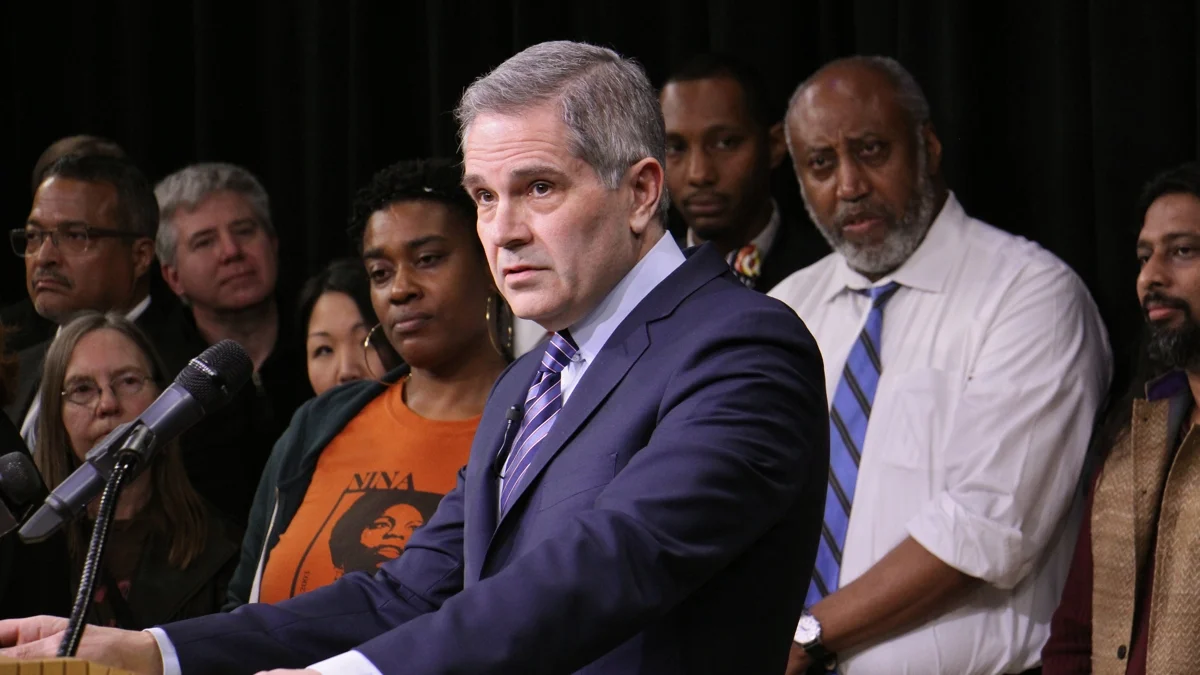Since the murder of George Floyd, cities and towns everywhere have proposed reforms that they hope can transform their police departments. Proposals range from more body cameras to eliminating police departments entirely. But what really works? Which of these will improve public safety, for everyone?
Read MoreHoping to leverage public frustration with rising crime, Philadelphia DA Larry Krasner's critics framed his reelection as a referendum on the incumbent's progressive reforms. In the end it was -- but not in the way they had hoped.
Read MoreSince George Floyd’s death, countless advocates, government officials, task forces and commissions have made demands and proposals for police reform. But one reform advocate took a novel approach: she went inside the police organization, and joined up.
Read MoreToday marks the one-year anniversary of George Floyd's murder by Minneapolis police officer Derek Chauvin. How have his death and the resulting groundswell of activism shaped the landscape for criminal justice reform?
Read MoreSince the killing of George Floyd in Minneapolis in May of 2020, many governments, commissions, and organizations have come out with plans to change police departments. What does this look like when the leaders of a reform effort are African American, from law enforcement, and female?
Read MoreFor years, advocates for better policing have pushed various reforms: consent decrees, civilian oversight, body cameras. But after George Floyd’s death and 2020, is reform still a viable alternative? Or is it defund or bust?
Read MoreAs president, Joe Biden can fight for the criminal justice reforms the electorate is demanding... or he can double down on his decades-long advocacy for tougher policing, harsher sentencing, and stricter drug laws. With Inauguration Day on the horizon, we ask: what will Joe do?
Read MoreThe elected chief prosecutor of St. Louis, a woman of color elected in 2016 on a reform platform, has faced intense pushback from the day she took office. Now Kim Gardner, the first African American to serve in the post, is suing the city and its police union under a federal law passed during Reconstruction to combat white supremacist vigilantism. Progressive prosecutors elected in other cities are rallying around Gardner, but can the suit succeed?
Read MoreAt the direction of Donald Trump, U.S. Attorney General William Barr is launching a national commission on crime and law enforcement. It's not the first time a president has formed such a panel, but indications are that this one will take a very different approach than its predecessors.
Read MoreTo celebrate the launch of our Patreon, we're sharing the first in a series of presidential candidate profiles: a look at frontrunner Joe Biden's amazing transformation from a tough-on-crime conservative Democrat during the '80s and '90s into a decarcerationist and would-be reformer on the 2020 campaign trail.
Read MoreAs reform-minded elected prosecutors gain power across the U.S., they’re increasingly coming under fire from their federal counterparts — most recently, an anti-democratic tirade by U.S. Attorney Bill Barr, who attacked progressive district attorneys for doing what voters elected them to do.
Read MoreCriminal Injustice season 1 guest Sam Walker argues in the Illinois Law Review that criminal justice reform is still possible.
Read MoreThe First Step Act was supposed to be a bold, bipartisan move toward federal criminal justice reform. But while the bill may actually become law, it's a baby step at best.
Read More[copy]
Read MoreIn U.S. courts using bail for pretrial release, those with enough money to get out before trial, but those without cash stay in. But support for reform has been building, and New Jersey did away with cash bail almost entirely in 2017. What happens instead of bail, and how is it working so far?
Read MoreIn the U.S., judges set bail – an amount of money defendants must deposit with the court -- to make sure people appear in court. Defendants must pay the bail amount to get released to wait for trial. Those with enough money to get out before trial, but those without cash stay in jail – regardless of the risk they pose. Could a data-based system do a better job of assessing these risks, and keep the poor out of jail before trial?
Read MoreFor years, the Philadelphia District Attorney's office was notorious for heavy-handed and often racially discriminatory prosecution. As of this month, it's led by a former criminal defense attorney and activist elected with a mandate for reform. What can we expect from D.A. Larry Krasner, and what pitfalls may await him?
Read MoreWhy has the US prison population grown for decades, surpassing two million? We’ve put more people in jail, but new research shows it’s not just how many people go to prison. What counts, for prison growth, is how long they stay.
Read MoreThe criminal justice system is designed to enforce accountability when bad things happen. But when it comes to preventing them from happening in the first place, courts and law enforcement agencies could learn a thing or two from the aviation and healthcare industries.
Read MoreWhen bad behavior by a police officer makes news, police often say that it’s just about one bad officer. But police departments seldom make the character of each officer the biggest factor in who they hire.
Read More



















